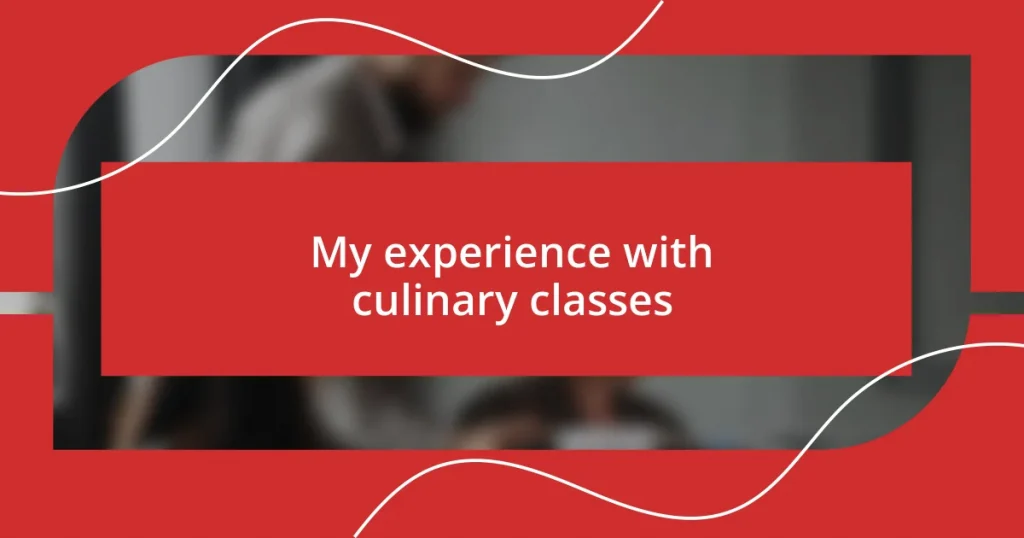Key takeaways:
- Culinary classes foster community connections, blending skill development with personal friendships through shared culinary experiences.
- Choosing the right culinary school involves aligning personal goals with the school’s offerings, considering factors like accreditation, course specialties, and opportunities for hands-on experience.
- Future opportunities in culinary arts include entrepreneurship, online cooking platforms, and a focus on sustainable gastronomy, emphasizing the importance of local ingredients and community impact.
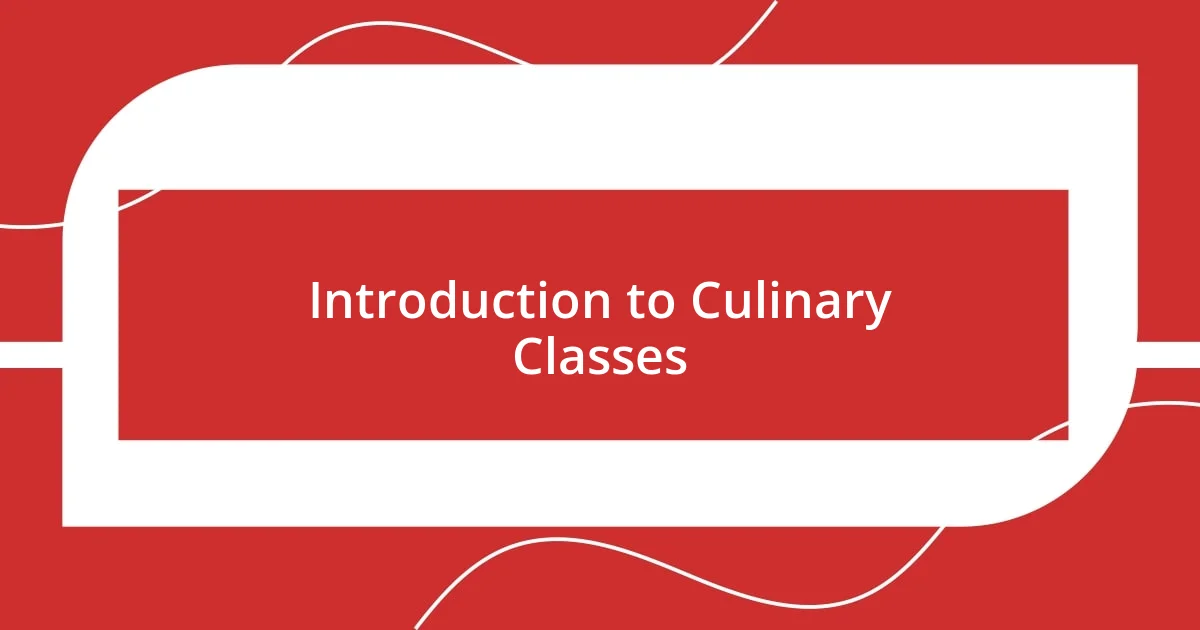
Introduction to Culinary Classes
Culinary classes can be a transformative journey, opening up new horizons in the art of cooking. I remember my first day in a culinary class; as I stepped into the bustling kitchen, there was an undeniable thrill in the air. Isn’t it fascinating how the scent of fresh ingredients can ignite our creativity in cooking?
What really captivated me was the sense of community among classmates. We all came from different backgrounds, yet our shared passion for food created instant connections. Have you ever bonded with someone over a perfectly sautéed onion? Those moments are what make culinary classes more than just about learning techniques; they’re about creating lasting friendships.
Every class is an adventure waiting to unfold. I still vividly recall the day we tackled our first multi-course meal; the chaos, the laughter, and the sense of accomplishment once we plated our dishes. Isn’t it incredible how a collective effort in the kitchen can lead to such delicious results? Culinary classes are a unique blend of skill-building and emotional growth, revealing not just how to cook, but how to express yourself through food.
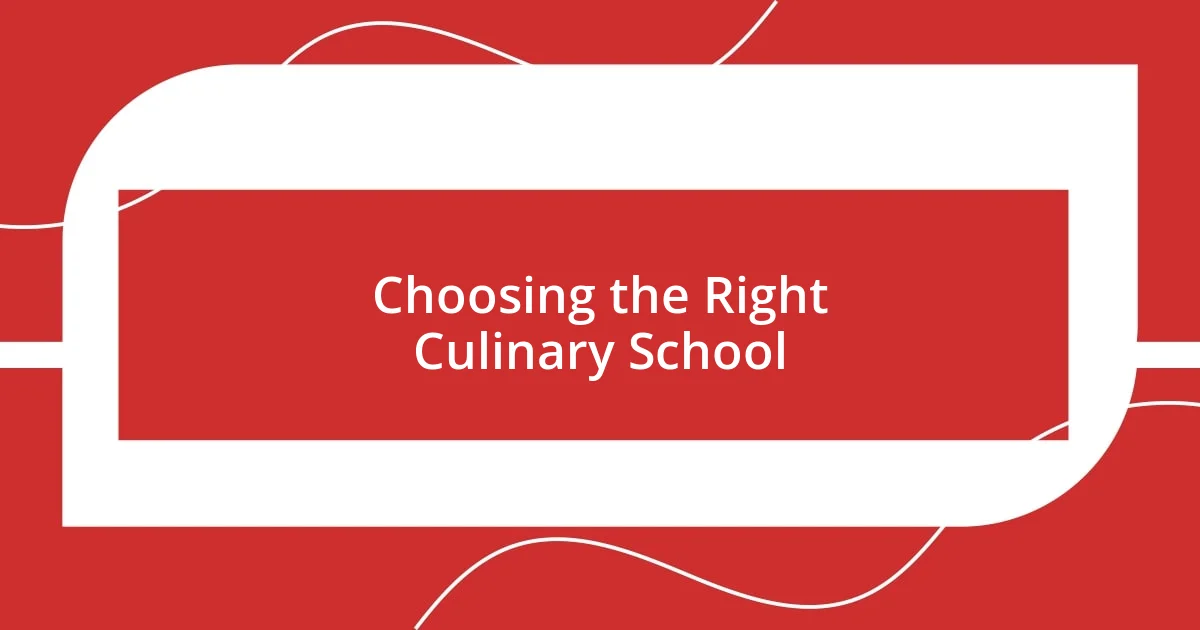
Choosing the Right Culinary School
When it comes to choosing the right culinary school, I can’t emphasize enough the importance of aligning your goals with the school’s offerings. You’ll want to consider the curriculum and specialties; after all, do you dream of mastering French cuisine or diving into vegan baking? Reflecting back on my search, I found it crucial to visit potential schools to soak in the atmosphere and chat with instructors. That’s when I realized that the vibe of the kitchen and the passion of the teachers can make all the difference in your culinary education.
Here are some key factors to consider:
- Accreditation and reputation in the industry
- Course offerings and specialties associated with the school
- Opportunities for hands-on experience through internships or workshops
- Student-to-teacher ratio to ensure personalized instruction
- Alumni success stories to gauge potential outcomes
Finding the right place is more than just a decision; it’s about ensuring that you feel inspired and excited every step of the way.

Overview of Class Formats
Understanding the different class formats in culinary education can really shape your learning experience. From my experience, I’ve encountered various formats, each offering its unique blend of structure and flexibility. For instance, hands-on workshops are vibrant and interactive, providing a dynamic space to practice techniques in real-time alongside seasoned chefs. On the other hand, online courses deliver the convenience of learning at your own pace, but sometimes you miss the immediate feedback that only in-person classes can offer.
I also found that the duration of classes can significantly affect your skill development. Intensive courses, spanning just a few weeks, can propel you forward quickly through a focused curriculum. However, longer classes designed for part-time students allow for deeper exploration and mastery of diverse techniques. That’s the beauty of culinary education; there’s something to cater to every aspiring chef’s lifestyle and objectives.
Lastly, don’t underestimate the value of community classes. They’re perfect for beginners, and I cherished the relaxed atmosphere they offered. Meeting fellow cooking enthusiasts and sharing recipes created an invigorating spirit that made the learning process enjoyable. Whether you’re enrolling in a formal school or a local class at a community center, it’s essential to find the format that resonates with your style.
| Class Format | Description |
|---|---|
| Hands-On Workshops | Interactive sessions focusing on practical skills led by experienced chefs. |
| Online Courses | Flexible learning at your own pace, often with video demonstrations but less immediate feedback. |
| Intensive Courses | Short, immersive programs ideal for rapid skill advancement in a condensed timeframe. |
| Long-Term Classes | More in-depth courses that allow for exploration and mastery over a longer period. |
| Community Classes | Casual environments offering beginner-friendly cooking experiences and shared learning. |
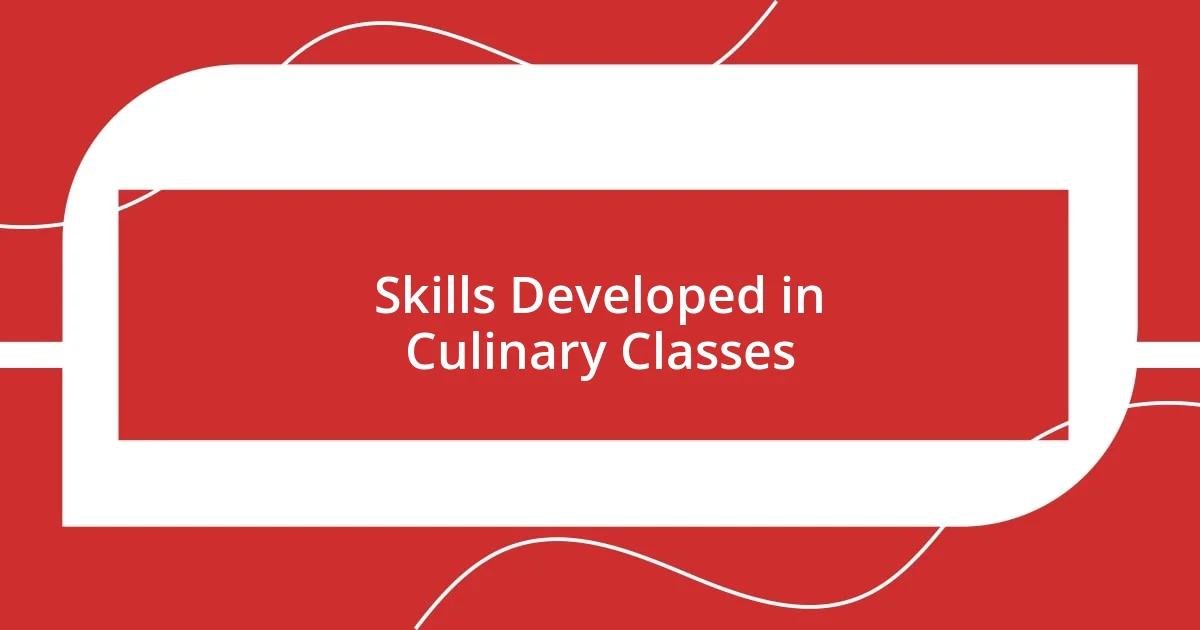
Skills Developed in Culinary Classes
One of the first skills I realized I was developing in culinary classes was knife skills. I remember standing at my station, surrounded by the aromas of fresh herbs and spices, learning how to chop an onion with precision. It felt empowering to transform a simple vegetable into a beautifully diced ingredient, and it’s a skill that sticks with you—something you carry into every dish you create.
As the classes progressed, I also honed my ability to plate dishes artistically. It was fascinating to discover that presentation can be as crucial as flavor. I vividly recall the rush I felt during a plating challenge, where each ingredient had to be thoughtfully arranged. Learning to elevate family recipes with a dash of creativity became a passion of mine, and I found myself asking, how can I make this dish not just tasty, but visually captivating too?
Furthermore, working alongside classmates taught me invaluable teamwork skills. Collaborating in groups for group projects—or even just sharing tools and tips—instilled a sense of camaraderie and mutual respect. I still reminisce about those late nights in the kitchen, laughing and experimenting together, recognizing that cooking is not just a solitary journey but one meant to be shared. Isn’t it amazing how food can create connections between people?
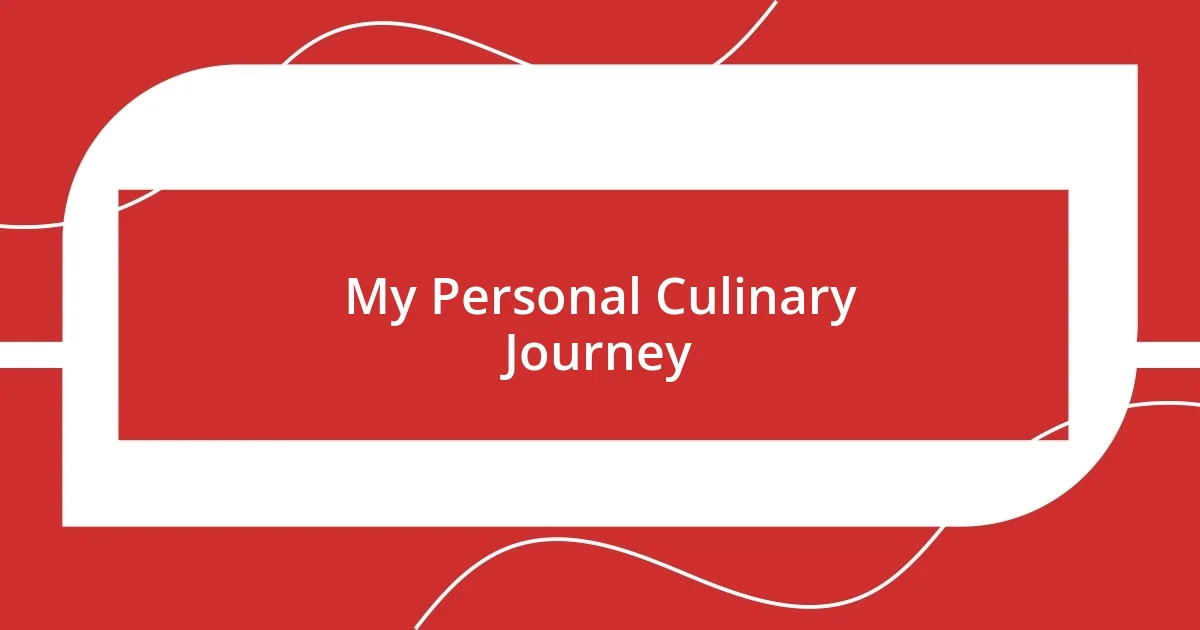
My Personal Culinary Journey
My culinary journey began unexpectedly when I signed up for a weekend class at a local culinary school. I can still picture the moment I hesitantly stepped into the bustling kitchen, my heart racing with excitement and a hint of anxiety. That first sizzle of garlic in olive oil was like music to my ears, igniting a passion I didn’t even know I had. Each lesson unfolded like a chapter of a beautiful story, revealing techniques and flavors that transformed my relationship with food forever.
One memorable experience was when we tackled the art of pasta making. I’ll never forget the feel of the dough between my fingers; it was messy but oh-so-rewarding. I could hardly contain my grin as I rolled out the sheets and watched them turn into luscious fettuccine. It struck me then—cooking isn’t just about following recipes; it’s about creating something with your own hands. It’s that hands-on experience that allows you to connect with the ingredients on a personal level, don’t you think?
As I progressed, I found that the kitchen became my sanctuary. The smells, the sounds, and the vibrant colors acted like a balm for the day’s stress. I remember late-night sessions, baking bread and perfecting my favorite recipes while listening to music. Those quiet moments taught me patience and resilience. They transformed cooking from a necessity to a joyous form of self-expression. Isn’t it fascinating how a simple act, like preparing a meal, can lead to profound personal growth?
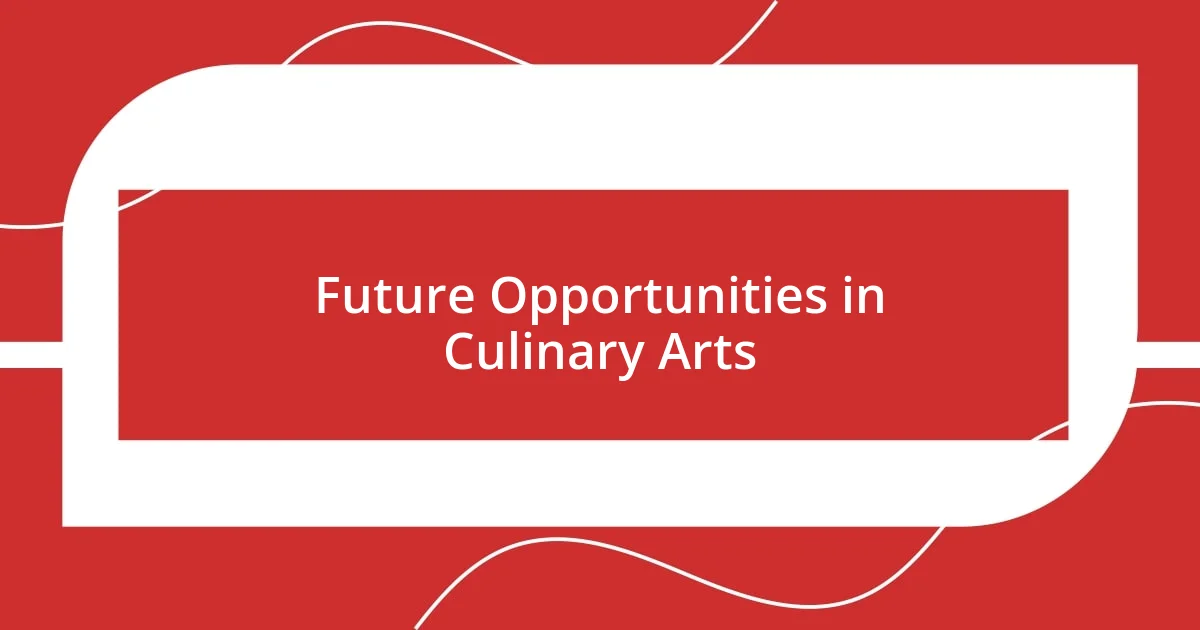
Future Opportunities in Culinary Arts
As I reflect on the future opportunities in culinary arts, I can’t help but feel excited about the diverse paths that lie ahead. I imagine myself stepping into a vibrant market as a food entrepreneur, perhaps launching my own catering business that showcases unique dishes from different cultures. The thought of creating a little haven where people can come together over a shared love of food is so appealing. Have you ever considered how fulfilling it must be to see your culinary creations bring joy to others?
Moreover, the rise of digital platforms opens up a whole new world for aspiring chefs. I’ve started thinking about the potential of online cooking classes or even sharing my own culinary experiences through social media. It’s incredible to realize that anyone with a passion for cooking can now reach an audience that spans the globe. Can you imagine the connections you could forge just by sharing your favorite recipes or cooking techniques online?
On the other hand, as the culinary landscape continues to evolve, opportunities in sustainable gastronomy are gaining momentum. I’m particularly passionate about incorporating local and organic ingredients into my cooking, and I believe that this trend represents a significant shift towards a healthier food system. Finding ways to promote farm-to-table initiatives feels not just rewarding, but necessary. Isn’t it inspiring to think that we can positively impact the world, one meal at a time?










